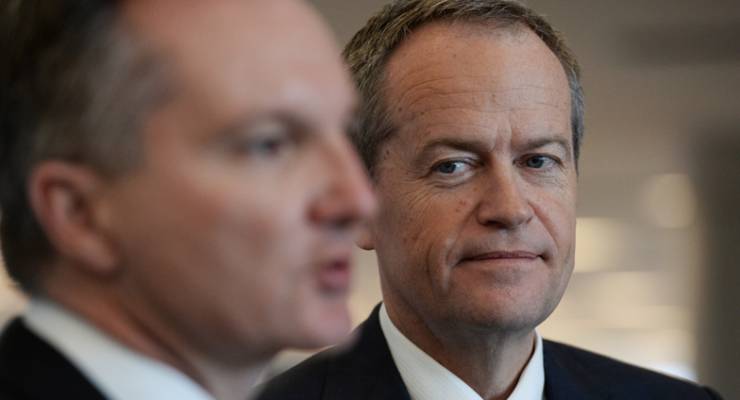
Opposition Leader Bill Shorten has unveiled Labor’s “10-year economic plan” in Brisbane this morning, showcasing its investment in education, infrastructure and renewables, support for innovation and women’s participation in the workforce and a commitment to “fair” budget repair.
Labor has been under pressure in recent days to give a more detailed explanation of the overall impact of its commitments on spending and savings, but Shorten refused to provide hard detail today, committing only that Labor would return the budget to surplus in the same year as the Coalition (now 2020-2021) but that it would run higher deficits in the intervening years, acknowledging “it is true that Labor will not have the same degree of fiscal contracts as the Liberals over this period”.
Labor’s overall plan is certainly richer and more coherent than the Coalition’s, which is based primarily on a mammoth tax cut to large companies in the hope that they will invest more and a willingness to spend far more than necessary on local defence procurement in decades to come (something Labor supports even more rabidly). By focusing on education, the NBN, renewables and female participation, Labor has identified known contributors to higher economic growth, in contrast to handouts to large companies that will flow offshore. Its focus on STEM studies, in particular, is important, given the number of Australian STEM students has been in freefall in recent years, particularly among girls and women.
But with the economy, fueled by a strong commodities-driven export performance, growing at 3% and massive monetary stimulus from the Reserve Bank via record low interest rates, Labor wants to pump even more fiscal stimulus into the economy than the Coalition between now and 2020-21.
The Coalition is already proposing to rack up $85 billion of deficits over the next four years — and that’s based on optimistic assumptions about commodities prices, nominal GDP and wages growth. Labor, it seems, will rack up more — although how much more isn’t yet clear and won’t be clear, apparently, for some time.
The debt now may be affordable — in fact, Australian bond yields have hit record lows in recent days, albeit in an international environment of low yields. And Labor, to its credit, is directing more of its deficit spending at productive investment — in education, in infrastructure, especially renewable energy and broadband infrastructure — than the Coalition, which is directing much of its deficit spending at corporate tax cuts and policies like Direct Action and negative gearing for existing housing stock.
But the problem, as Moody’s noted in the wake of the budget, is that neither party is displaying the political will to cut spending or raise taxes enough to address the deficit — both sides have a de facto policy of pushing the return to surplus back and offering 10-year projections that show a return to consistent surpluses only in the next decade. Indeed, spending has gone up under the Coalition compared to the levels it inherited from Labor. Scott Morrison has repeatedly said he wants to do more on curbing spending, but he has refused to say which areas he would target. This is the government that is intending to blow $10 billion more than necessary on local defence procurement to save its seats in South Australia and that threw out the prime minister and treasurer responsible for the 2014-15 budget, even though that actually did little to curb immediate spending. No wonder ratings agencies aren’t confident that there is any political will to address the deficit, rather than simply keep extending it every year.
Now Labor has confirmed that it will be even less disciplined than the Coalition, even if it’s making better use of its deficit spending than giving a handout to multinational companies. The Coalition will froth and fulminate about Labor’s profligacy, but it’s like one drunk accusing the other of failing a breath test. And if a serious economic downturn strikes the global economy, both sides will find they have far less fiscal room for manoeuvre in formulating a response.
Last week the Prime Minister challenged critics of his (commendable) superannuation tax changes to “get real”. It’s advice both sides should be taking on the budget.








That “lazy” fiscal policy is the only thing that is creating growth and jobs, and its barely enough as is evidenced by record low bond yields and underemployment. Until now, its the unspoken and bipartisan policy. Fiscal balance will follow after economic capacity is more fully utilised.
Tragedy is that an individuals wealth (Trump and Turnbull) is thought to be a measure of economic skill and that thrift (austerity) is still promoted as good.
When does a giveaway to multinationals give the same return as investing in the health and education of the workforce? The difference is not exposed by adding up the numbers.
Bernard Keane is economically illiterate. A federal government deficit is neither good nor bad; it is an indicator that should float to whatever level it needs to be at to promote full employment at any given time. The federal government balance is not a creature that can be wounded or sick; it is not a machine that can break. Right now, a larger government deficit is necessary to achieve full employment.
Why do people care what ratings agencies think? Not like their “opinion” makes a difference on govt bond prices
A Budget surplus is when the government takes in more than it spends, and does nothing with the difference. If it tried to do something then it wouldn’t be a surplus as it would be spending that extra money it took in. A government surplus reduces the assets of the private sector – why would any sensible government want to do that?